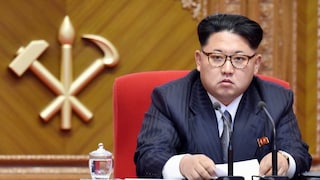Following UN sanctions, Kim Jong-un's regime threatened to respond to the US with a "sea of fire"
That approved by the United Nations Security Council punishes North Korea with about one billion dollars in annual income.

North Korea threatened Sunday to respond with "a sea of fire" to military actions or sanctions against it , following the adoption on the eve of new measures of pressure on Pyongyang by the UN Security Council.
"The day the United States dares to provoke our nation with nuclear weapons or sanctions, the United States will be submerged in an unimaginable sea of fire, " the official daily Rodong Sinmun said in an editorial.
The article accuses the United States and its allies of maintaining its "hostile" policy against the country and risking "self-destruction," and stresses the need for North Korea to have nuclear weapons to defend itself.
"The commitment of the Trump band to continue in this quagmire will only have the effect of motivating our Army more, and giving more reason to the Democratic People's Republic of Korea (the official name of the country) to possess nuclear weapons," said the paper Workers Party .
The commitment of the band of Trump to continue in this impasse will only have as consequence more motivate to our Army. The ability to undertake a powerful dissuasive war is a strategic choice of defense for our people, which has already gone through a horrific war; the editorial added.
The sanctions adopted on Saturday by the Security Council of the UN raise the pressure on the regime led by Kim Jong-un with vetoes several sectors of its economy, and sent a message of unity against the "global threat" he sees in his Missile tests.
The 15 countries of the body unanimously adopted a resolution that took a month of negotiations, reducing the income that the Pyongyang regime obtains with its exports by up to 1 billion dollars (849 million euros) a year .
The text includes a veto on North Korean coal exports, which will cost the country a loss of $ 401 million / 340 million per year; Of iron ($ 250 million / 212 million); ($ 110 million / 93 million euros) and shellfish ($ 300 million / 254 million euros), among other measures against companies and entities that support the country's weapons programs.